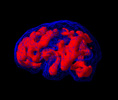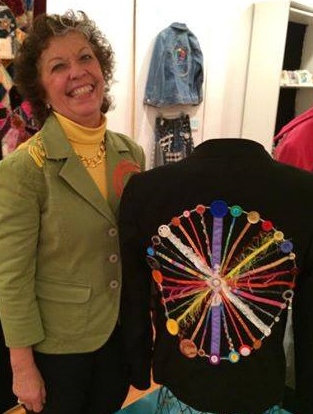Top Ten – Oops- A Baker’s Dozen Tips & Tools to Help CASIGYs
(Creative, Highly Sensitive, Intense, Gifted People )
Overcome Sensitivity, Anxiety and Depression.
© 2010 Sharon M. Barnes, MSSW, LCSW
To people of the World War II generation, depression is a massive downturn in the national or global economy. In the earth, a depression is a place where the dirt is lower than in surrounding areas. To highly sensitive or gifted people, depression is a depressed state of being that can affect mind, body, soul and spirit. In fact, Anxiety and Depression are the most common issues that CASIGYs (Creative, Acutely Aware, Super-Sensitive, Intense, often Introverted, and/or Gifted You!) bring into counseling offices around the world.[i]
Why Do CASIGYs So Often Become Anxious or Depressed? 
Well, for one, CASIGYs by nature, have more perceptive and more reactive Central Nervous Systems. They perceive things that most others don’t, and on top of that, they often have an intense response to whatever they perceive. So it takes less of a ‘something’ to be troublesome to a CASIGY. And when things are trouble, they’re usually DOUBLE TROUBLE! It’s important to understand and remember that this comes from having a different physiology, not from being a Drama King or a Drama Queen!
It can also be hard for many CASIGYs to find a peer group, sometimes even with other CASIGYs. The specific combination of creativity, intelligence and sensitivities, the variety and depth of interests, and great intensities may become like snowflakes that cannot stick together when temperatures are extremely low. Because of this, CASIGYs may often feel like misfits and struggle with feelings of not belonging, even with other CASIGYs. CASIGYs also may find that their great gifts are accompanied by great physical or emotional vulnerabilities, and because of this, find that they must put forth great effort to manage their sensitivities and intensities.
Many of my CASIGY clients have told me that the tools they value the most to help them with  anxiety or depression:
anxiety or depression:
- are things to DO, not just to THINK or FEEL,
- take into account their intensities and sensitivities,
- integrate all types of intelligence,
- incorporate creativity into their healing and growth process,
- help to unify body, mind, soul and spirit.
Together these self management skills and the resultant general confidence can bring the ability to cope creatively and heal intelligently.
However, by the time that CASIGYs arrive at my therapy office, they’re often in crisis. Many of them have already used multiple self-help tools before reaching out for professional help. So when they do finally seek someone to consult with, their distress level is often very high.
In this situation, I’ve found that a good place to start is with simple things they can DO that will bring some immediate relief, especially from the over-stimulation of their central nervous system. Learning these self-relief tools builds confidence ultimately bringing long-lasting positive results.
The Bakers Dozen Tips & Tools
to Assist with Anxiety and Depression
Tool#1: Breathe.
First up is a breathing tool that activates the Parasympathetic Nervous System, which is the Relaxation Response, while at the same time deactivating the Sympathetic Nervous system, which is the Fight-or-Flight Response.
- Put your tongue on the roof of your mouth. (This acts like a toggle switch in the body, helping to shut off the Fight-or-Flight Response and to activate the Relaxation Response.)
- Breathe out while counting to 8.
- Hold your breath for a count of 7.
- Breathe in while counting to 4 (pull it in strong and fast to get enough air in).
- Repeat this cycle (8-4-7) at least four times. Time the speed of the cycles according to how long you can comfortably hold your breath.
How Did This Work for You?
Did this help relax your anxieties? Some people notice a relaxation benefit from the first time they use it; others develop positive results over time. For best results, practice it three or more times a day or even hourly, especially while you’re learning it, and daily to stay in practice.
Tip #2. When you’re feeling depressed or anxious, don’t fight it; acknowledge and allow yourself to feel  your emotion.
your emotion.
Fighting an emotion strengthens it. Trying to keep your feelings at bay keeps them inaccessible to you and gives them power over you that you are not aware of, and therefore you can do nothing with or about them. Instead of resisting and fighting what you are feeling, empower yourself. Give yourself permission to feel what you feel, then flow with it. This will help you first feel it, then release it.
 Tip #3 Identify what other emotions besides anxiety or depression that you are also feeling.
Tip #3 Identify what other emotions besides anxiety or depression that you are also feeling.
Creative, sensitive, gifted, introverted people are especially complex; identifying the various emotions we are feeling helps to sort them out by naming them. Like with Rumplestiltskin, naming has great power; allowing us to be empowered in realizing and accepting what we are feeling. Sometimes naming our emotions can be enough, at other times, our emotions are more complicated and need also to be expressed or processed. (See # 11 for a creative, sensitive, intelligent, introverted way to express and process them).
Tip #4 Recognize what’s happening in your life that is connected to your emotions.
Have you had some losses or disappointments? What are you anxious or frightened about? What are the events in your life that are pushing  your emotions?
your emotions?
Your emotions respond to the events in your life, to the weather, and to many other things. The events in your life are invisibly interconnected with your internal processes and can affect your ‘waves’ of emotion. Normally, the smaller the events, the smaller or less intense the emotion that you experience, and vice versa. Because this is not always so, we’ll move on to our next tool.
 Tip #5 Ask yourself: does the intensity of my emotion match what’s happening in my life?
Tip #5 Ask yourself: does the intensity of my emotion match what’s happening in my life?
If not, what else could your current emotions be connected to? It’s common to experience an intensity of emotion relating to more than one event or a combination of current, past and future anticipated events. Each new event or situation that is painful resonates with all the other events in your life that triggered that same frequency of pain. Knowing that you’re responding to multiple things simultaneously―and knowing what they are―can be freeing. If it’s not, that’s a clue that you likely need to work with it more.
Dealing with the intensity of emotions can also be a sticky wicket in other ways for creative, sensitive, introverted, gifted people. Research in giftedness shows that the more gifted people are, the more sensitive they are. That means that you notice and react to things that others have no awareness of and you react more intensely than others do to things that affect everyone.
You can feel traumatized when others have no clue about what you’re going through, and therefore they treat you without the sensitivity that you need. You may also be unable to ask for what you need at that time because by the time you know you need something you are overstimulated, hyperventilating, and flooded with sensation and emotion. When that happens, first, go back to #1 and breathe; then flow with it, as in #2, name what you’re feeling, and what it’s connected to; and come back to identifying the size of the wave of your emotion in relation to what happened.
Tip #6. Does something need to be done about your emotions and/or the circumstance(s) related to them?
If something DOES need to be done, then DO WHAT YOU CAN DO, such as balance your checkbook, make a doctor’s appointment, call a plumber, rake your leaves, talk to your boss, apologize to your friend, etc. Much of the time your emotions are messages from your body or your wiser self. Your best response in this situation is to listen and take heed.
At other times, like Chicken Little, we think the sky is falling when it’s only a passing thunderstorm. It is absolutely crucial to discover what’s REALLY going on, AND what needs to be done about it, if anything.
 Tip #7 Let go of what CAN’T be done or DOESN’T NEED to be done.
Tip #7 Let go of what CAN’T be done or DOESN’T NEED to be done.
Grieve the losses, forgive your mistakes, and forgive others’ mistakes. Let go of unrealistic expectations. Allow yourself to be human. Just because you can think fast on several tracks at once doesn’t mean you can do, or should do, everything perfectly. It also doesn’t mean that you’ll never have a learning curve, make any mistakes in life or run out of energy or other resources.
Tip #8 Don’t wait until you feel good to treat yourself well.
What would you do IF you felt good? DO IT NOW, even though you don’t feel like it. Eat healthy food, feed yourself three times a day with that healthy food, smile, talk to a friend, take a walk, clean your house, do your laundry, dress nicely, etc. The temptation when you’re depressed or anxious is to act how you feel. This feeds the depression or the anxiety, and sets up a spiral that, especially for CASIGYs, can get out of control in a heartbeat.
To interrupt the negative cycle, act as you would act when you feel well. This will help you feel better, and feel more like doing the things that help yourself. In other words, it can get a positive cycle going again. Remember though – treating yourself like you would if you felt good does not mean to treat yourself without creativity, sensitivity and intelligence.
 Tip # 9. Turn your emotion into motion.
Tip # 9. Turn your emotion into motion.
Exercise: take a walk, ride a bike, go to the gym and work out, pull some weeds, scrub your kitchen floor or bathroom. DO something physical. Aerobic exercise gets the heart pumping, the blood circulating, the breath moving faster and deeper. It also produces endorphins, the body’s own pain killer, stronger than morphine. Exercise also increases oxygen levels to the brain and balances neuro-transmitters, reducing both anxiety and depression.
Advantages
Exercise can also build self esteem, self confidence, improve your memory, improve your digestion and elimination, all of which influence how you feel emotionally. You don’t have to do vigorous exercise to benefit from it; moderate exercise also brings many rewards.
An advantage of outdoor exercise such as walking or running, is that it is grounding. For people of high creativity and intelligence who have a rich thought life, it is easy to build castles in the air—castles of unrealistic expectations or anxious, depressive ruminations. Walking or running on unpaved paths connects you to the earth and gets you back in touch with the step by step processes of nature. You can also have daily reminders that life is messy and imperfect.
Tip #10 Balance your brain.
Neurotransmitters are the biochemical components of the emotions you feel. Balancing them will therefore help balance your  emotions. The neurotransmitter serotonin can be lacking in both depression and anxiety. Many anti-depressants help the brain utilize existing serotonin or otherwise increase serotonin levels in the brain.
emotions. The neurotransmitter serotonin can be lacking in both depression and anxiety. Many anti-depressants help the brain utilize existing serotonin or otherwise increase serotonin levels in the brain.
You can balance naturally by relaxing. Take some time out to help your body de-escalate from the stresses of the day. Meditation, Yoga, Prayer, Tai Chi, Chi Gong, and progressive muscle relaxation exercises all can help to activate the relaxation response physiologically. Take a relaxation break instead of a coffee break. Go into your bedroom, shut the door and put out a ‘Do Not Disturb’ sign.
Psychotherapy also helps to balance brain function by producing changes in the neuronal pathways of your mind. In this way, the biological and psychological approaches are unified in treating anxiety and depression. You may wonder, “How can I know when to seek counseling or psychotherapy?” In a nutshell, the time to go for professional help is when you’re doing everything you can, and you’re still not getting better.
 Tip #11 Give Thanks for what is going well in your life.
Tip #11 Give Thanks for what is going well in your life.
The corollary to acknowledging the sadness, difficulties in life and our emotional responses to them is to acknowledge and honor the good. Often it’s good to start simple: Did the sun come up today? Did you eat today? Do you have clothes to wear (maybe they’re not the ones you’d prefer, but do you have some)? Do you have a roof over your head? Can you read? Start with the basics, and expand from there. The harder it is to feel grateful or connect to gratitude, and the more irrelevant it seems, the more powerful you may find it to be, and the more important it is to activate.
When you have had a truly horrendous day, it can be most rewarding to congratulate yourself that you have found something to be thankful for, which can be a great accomplishment in and of itself.
Tip #12.Stop going through life as the Ugly Duckling. Accept that you’re a Swan. 
Learn about your giftedness, sensitivity, intensity, introvertedness and creativity. Honor yourself enough to accommodate your vulnerabilities so that your strengths have an opportunity to shine through.
 Tip #13a. On the other hand, you may find that none of these tools are working for you.
Tip #13a. On the other hand, you may find that none of these tools are working for you.
When you do these things, you may feel like you’re sinking deeper into depression. You may try, but can’t DO what you know you should be doing. If that’s the case, that’s a good time to GET HELP. Don’t have to wait until you’re ready to jump off a ledge! Start looking for help-NOW! Many people have told me that they wished they hadn’t waited as long as they did to ask for help. If you’re wondering where to start, my free article, When Can Counseling Help? may be helpful.
Tip #13b: Be Brave
Asking for help is NEVER easy. I’ve also found that asking for help can be even more difficult for creative, sensitive, gifted  people than for many others. You’re used to doing your own research, and often you know more than those who are supposed to be in a position to help you, so why should this be any different? The truth is, it may not be. You may have to talk with more than one person to find someone you feel can be helpful to you. So don’t give up after one experience that doesn’t help, learn from it and be brave enough to go and keep seeking help until you find it.
people than for many others. You’re used to doing your own research, and often you know more than those who are supposed to be in a position to help you, so why should this be any different? The truth is, it may not be. You may have to talk with more than one person to find someone you feel can be helpful to you. So don’t give up after one experience that doesn’t help, learn from it and be brave enough to go and keep seeking help until you find it.
In the end, the experience of having depression and anxiety can be a golden opportunity to increase your quality of life and to further your personal development. Approaching it with an openness to learn and grow can help you not only return to your former level of health and happiness, but it be a catalyst for helping you become fully alive, and fulfill your destiny as a creative, sensitive, intense, gifted person.
I hope you’ve enjoyed reading these tips and tools, and even more, using them.
I’d love to hear from you:
Which ones did you try out?
Which ones did you find most helpful?
Was there something missing-something that nags you that I didn’t address?
You can phone me at 303-987-0346
or email me and I’ll be happy to answer your questions.
Thanks for requesting this Free Report from the Academy of Creative Living. We look forward to continuing to help YOU as a CASIGY™ become fully alive and fulfill your destiny.
Creatively,
Sharon M. Barnes, MSSW, LCSW
AKA The Scrap Lady
I Help CASIGYs Create Beauty & Benefit from Life’s Scraps.
www.TherapistForSensitiveAndGifted.com
8089 South Lincoln Street
Littleton, CO 80122
Phone: 303-987-0346
[i] Webs, James, Amend, Edward, Webb, Nadia E. and Goerss, Jean: Misdiagnosis and Dual Diagnoses of gifted Children and Adults: ADHD, Bipolar, Ocd, Asperger’s, Depression and Other Disorders.


